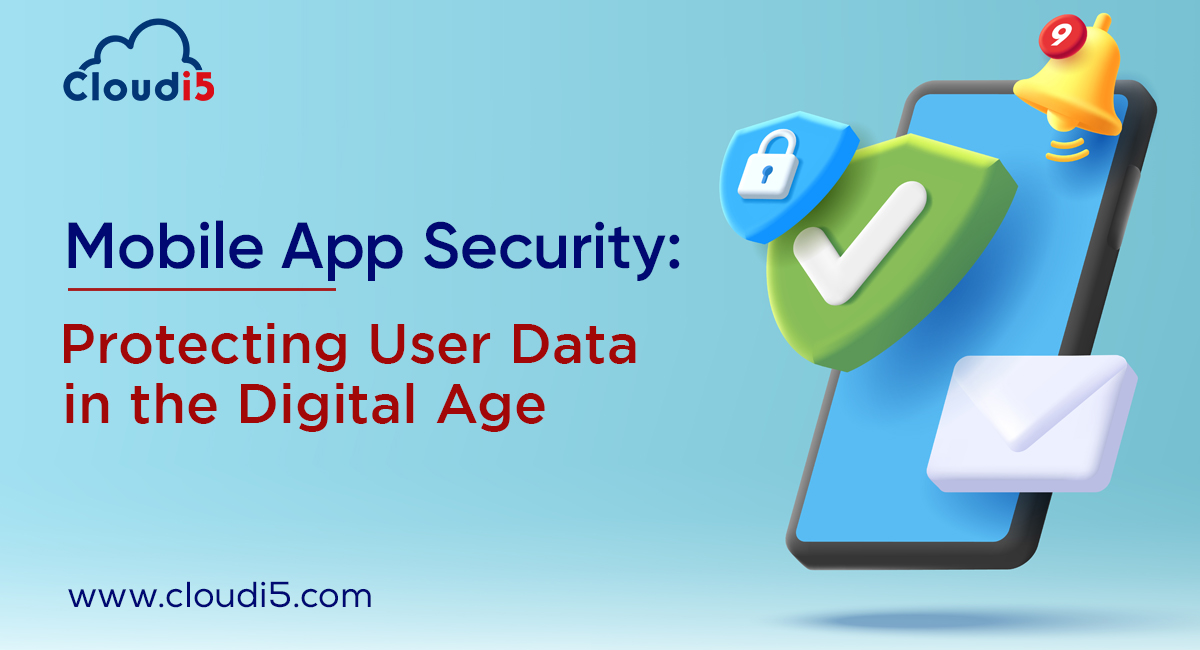
Mobile App Security: Protecting User Data In The Digital Age
In today's digital age, Mobile applications have become a vital part of our lives by delivering convenience and efficiency in areas such as communication, entertainment, and business.
This increased reliance on mobile apps, however, raises concerns about user data privacy and security.
In this blog, we will see how important Securing user data in mobile applications is for protecting privacy and avoiding potential hazards such as identity theft and Cyber Attacks.
What is Mobile App Security?
Mobile app security refers to the practices, safety measures and strategies arranged to protect mobile apps and the data which is used to protect from threats and vulnerabilities.
The major purpose of mobile app security is to ensure that sensitive user data, such as personal information, login credentials, financial information, and other private data, is kept secret and is not hacked or accessed by unauthorized individuals or harmful entities.
How can we protect our privacy in Digital age?
In the digital age, protecting users privacy is a primary responsibility for a mobile app development company. Given the rising quantity of personal information we disclose online, protecting your privacy in the digital era is critical. Here are some key points to help you protect your privacy:
- Create strong and Unique passwords:
Create strong and difficult passwords for your accounts. Think about using a password manager to generate and store passwords securely.
- Turn on Two-Factor Authentication (2FA):
Enable 2FA on your online accounts wherever possible. This adds an extra degree of safeguarding by forcing you to submit a second piece of information in addition to your password, such as a one-time code delivered to your phone.
- Update Software and Devices on a Regular Basis:
Update your operating systems, apps, and devices with the most recent security patches. Cybercriminals frequently target known flaws in obsolete software.
- Use a VPN (Virtual Private Network):
A VPN can help you remain anonymous on the internet by concealing your IP address and encrypting your connection. To improve your online privacy, use a trustworthy VPN provider, especially when utilizing public Wi-Fi.
- Be wary of Public Wi-Fi.:
Unless you're utilizing a VPN, avoid accessing public Wi-Fi networks for critical activities like online banking or shopping. On insecure public networks, hackers can simply intercept data.
- Limitations on Social Media Sharing:
Take care regarding the information you post on social media networks. Examine and modify your privacy settings to limit who can see your posts and personal information.
- Use secure texting tools such as Signal or WhatsApp:
For confidential communications, use encrypted messaging programs such as Signal or WhatsApp. End-to-end encryption is used by these apps to protect your messages from prying eyes.
- Examine the Privacy Policies:
Read the privacy policies of any new services or apps before signing up for them. Learn how your data will be gathered, utilized, and shared.
- Turn off your webcam and microphone:
To prevent unwanted access, cover your webcam when not in use and mute your microphone on devices when not in use.
- Encrypt Your Information:
To protect critical data on your devices, use encryption technologies. Full disk encryption on your computer and app encryption for your mobile devices can protect your Data.
- Educate Yourself:
Keep up to date on current privacy risks and best practices for online privacy. The more you know, the better you will be able to protect yourself.
Keep in mind that protecting privacy in the digital age requires constant monitoring and adapting to changing dangers. To secure your personal information online, be cautious and employ a combination of these measures.
What is data privacy and protection in Mobile App Development?
In this Digital Age, Data privacy and protection in Android App Development and Mobile App Development relates to the practices and methods targeted to protect individuals' personal and sensitive information in an era when digital technologies are extensive, and data is constantly gathered, processed, and distributed. An amazing fact of Mobile App Development is that the developers are concentrating more on privacy-first app design, with a rising number of apps emphasizing user data security.
To maintain user privacy and protect sensitive information, mobile app developers, like all enterprises that handle personal data, must follow best practices and legal requirements. Here are some of the most important features of data privacy and protection in mobile app development.
- Protecting Personal Data:
This involves any information that can be used to identify an individual, which includes their name, address, phone number, email address, bank data, health records, and other personal information)
It is critical that you safeguard this information to avoid identity theft, fraud, and other harmful behaviours.
- Consent from Individuals:
Before collecting data from consumers, mobile apps should always obtain their explicit consent. This involves notifying consumers about the types of data being gathered and how they will be utilized. Consent should be obvious, simple, and easily reversible.
- Data reduction:
Gather only the data required for the app's functionality. Avoid gathering unnecessary or useless data. Data gathering is minimized to limit the danger of data breaches and privacy violations.
- Data Encryption:
In mobile app development, app encryption entails the use of cryptographic techniques to safeguard sensitive data within the app, both while it is stored on the device and when it is transported over networks. To protect data in transit and at rest, use robust encryption techniques. This ensures that even if data is intercepted or the device is compromised, unauthorized persons will be unable to read it.
- Protection of Storage:
Securely store user data on the device and on backend servers. Implement secure authentication measures to ensure that only authorized individuals have access to data saved on your system.
- Control of Data Access:
Implement access controls in the app and on the server to limit who has access to and may edit user data. Access to sensitive data should be limited to authorized individuals only.
- Auditing and monitoring on a regular basis:
Constantly monitor the app and its backend services for security flaws and strange behaviour. Audit the app's data handling mechanisms on a regular basis.
- Authentication of Users:
Use robust user authentication techniques, such as two-factor authentication (2FA), to ensure that the app and its data are only accessible to authorized users.
- Policies Regarding Privacy:
Make the app's privacy policy clear to users, including how their data is managed, who it is shared with, and their data rights.
- Services Provided by Third Parties:
If the app makes use of third-party services or libraries that handle user data, make sure that these services follow data privacy and security best practices as well.
Data privacy and protection are important factors in mobile app development, not only to secure users' sensitive information but also to generate trust and maintain a strong market reputation.
What are the types of security for Mobile apps?
For the security of data and the app system from numerous threats and vulnerabilities, security is a vital part of mobile app development. Data security in mobile apps is essential for securing sensitive user information and retaining trust. Mobile apps can be protected by a variety of security mechanisms and practices, including:
- Authentication and Authorization Security:
User Authentication: Use passwords, PINs, biometrics (fingerprint or face recognition), or two-factor authentication (2FA) to verify that only authorized people can access the app.
Authorization: Define and enforce access control policies to limit user access to specific app features or data based on their roles and permissions.
- Data Encryption:
Use encryption protocols such as HTTPS to safeguard data sent between the app and distant servers, ensuring that attackers cannot intercept the data.
- Secure Communication:
Implement safe APIs and guarantee that the app connects with backend servers and third-party services in a secure manner. Avoid hardcoding sensitive information in the app's code, such as API keys or credentials.
- Secure File Storage:
To avoid unauthorized access or data leakage, secure sensitive files such as user-generated content or cached data.
- Network Security:
By validating SSL certificates and employing secure communication protocols, you may protect the app against typical network threats such as man-in-the-middle (MITM) assaults.
- Secure Coding Practices:
To reduce vulnerabilities, use secure coding methods such as avoiding hardcoding passwords or utilizing parameterized queries to prevent SQL injection attacks.
- App Permissions:
Request and use app permissions sparingly, seeking only the data and hardware resources required for the app's functionality.
- User Data Protection:
Implement data minimization, encryption, and safe storage procedures to protect user data. Observe data privacy laws and user consent requirements.
- Security Updates:
Continuously monitor and address security flaws by issuing and encouraging users to install security updates and patches on a regular basis.
- App Store Security Policies:
Follow the security standards and policies of the app stores where you publish your program (e.g., Apple App Store, Google Play Store).
- Protections apps for Android:
It is necessary to protect your Android device against security risks in order to secure the protection of your data and privacy. There are various protection apps for Android that can help protect your device.
These security measures should be applied as part of the mobile app development process and be reviewed and revised on a regular basis to keep up with evolving security risks.
Conclusion:
Mobile app security is a continuous process that necessitates regular awareness and adaptation to new threats. You can improve the security of your mobile app and secure user data in the digital age by using these best practices.
Trusted By












Leave Comments